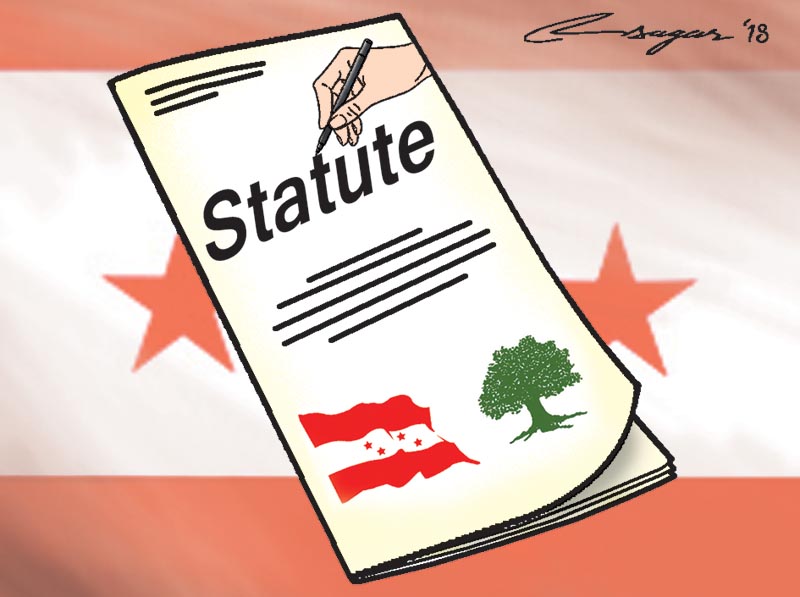NC’s new course: Statute amendment
Since its inception, the Nepali Congress has always fought for democracy. But it should also follow democratic principles within the party. The NC stands at a crucial juncture now and statute amendment can only decide the party’s future course
A statute is a set of rules that determines the operation and function of an organization and institution. A statute is an evolving document, as amendments are made to it as per the requirement. For an organization to function in a proper and lawful way, it must strictly abide by the statute. For the Nepali Congress (NC), its statute determines its course of action and its destination. An amendment to its statute is what the Congress party now needs not only to establish itself as a proactive party—with strong leadership—but also to bring social, political and economic development in the society.
The Congress party’s maha samiti meeting has been set for December when it will start working on statute amendment. A drubbing in the recent elections came as a wake-up call for the Congress party which is grappling with intra-party dispute and leadership feud. A section of leaders has been saying that the party is paying a huge price of its visionless leadership.
So a statute amendment now will set the new course for the party, as it will decide the central committee members. Only a scientific amendment to the party statute can rid the NC of ineffective leadership.
A party statute must recognise all the leaders of the party as equals irrespective of the posts they hold. All the leaders at different levels must have a say in the party and the party’s central committee must be inclusive. This is possible only if central committee members are elected from wards. The party president must be able to recognise this fact and should prepare himself to face voting.
There should be a clear, transparent and scientific approach for distribution and selection of party members across the nation. The genuine and active members of the party should be the voters for the upcoming general assembly. This will pave the way for intellectuals and young people to get into the central committee.
There should be a clear and transparent policy in the statute for active member or elected member or nominated member for their qualification or disqualification in party activities. Those who flout the party statute should be disqualified from their voting rights. This will strengthen discipline and help improve the party’s image.
To ensure inclusivity and reservation, the party statute must clearly set out rules as such that same person does not get repeated under the inclusive and reservation quota. This will help meet the objective of the reservation policy and ensure that genuine persons are selected/ elected.
Different ideas and suggestions are coming from different sections and they are under discussion. Some party members are of the view that power should be concentrated in the party president. This concept in no way is suitable and will be detrimental to the party.
While amending the statute, extensive discussions are required and people’s voices should be taken into consideration. The Nepali Congress today is at such a phase that it should strengthen the party, not the party president.
The Congress party since its inception has always fought for democracy and people’s rights. In a democracy, the people are supreme, not a particular leader, and the Congress party has always believed in this motto. Hence,
it’s high time the Congress party focused on strengthening democracy within the party also, and for that statute amendment is the need of the hour. And
the amendment should be carried out in such a way that it does not weaken
the party.
As the Congress party has always followed the principles of democracy and believed that a statute is an evolving document, it has amended its statute in the past as well—in 2051, 2054, 2057, 2062, 2064 and 2066 BS. These amendments were timely as they always helped in strengthening the party and improving the party’s image. Yet another amendment will show the new direction to the party for its future course. From the beginning, the party has been the voice of the people and stood for rule of law. The leaders elected from the 14th General Assembly should continue to stick to principles of democracy.
The Congress party’s contribution to the nation and its people is immense. It’s the Congress leadership that played a proactive role in bringing then rebel Maoists to competitive politics. Its contribution in ushering in democracy and peace cannot be ignored. But in due course, different groups have left the party to form their own fronts and outfits. Some have returned home, while others have their own parties. There were different reasons for the split(s)—some left the party because they felt their voices were not heard, others might have left for their personal ambitions. But whatever the reasons, the Congress party has established itself as the only democratic party in the country, and it’s about time it brought together all democratic forces under one umbrella to make the Nepali Congress even a stronger democratic force.
Of late voices from different sections within the party have grown stronger against the party president. This indicates mistakes were made on the part of party chief. But leaders must stop squabbling and unite for the betterment
of the party. Strong leadership can guide the party towards success. Only strong leadership can help the party achieve party’s goal
of nationality, democracy and socialism. The party president and central committee should hear the voices of all sections and introspect.






